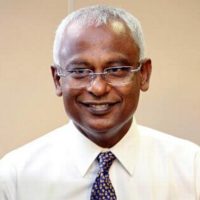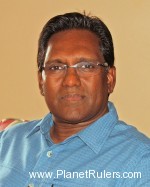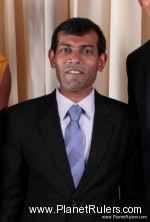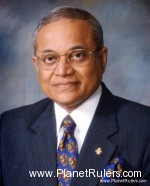Ibrahim Mohamed Solih, President of the Maldives (elected on Sept 23, 2018)

He was first elected to parliament in 1994, aged 30, as the MP from his home atoll of Faadhihpolhu (Lhaviyani). Solih played a leading role in the formation of the Maldivian Democratic Party (MDP) and the Maldives Political Reform Movement from 2003 until 2008, which led to the country adopting a new modern constitution and multiparty democracy for the first time in its history. Solih was also a senior member of parliament and the Special Majlis.
Solih was born on Hinnavaru Island but moved to the Maldives’ capital island of Male’ at a young age for education, and he has been a resident since. He is one of 13 children. He is married to Fazna Ahmed and they have a daughter named Sarah and a son named Yaman.
Solih is one of the closest friends of former President Mohamed Nasheed, who is also the first cousin of Solih’s wife Fazna. Solih and President Nasheed played an instrumental role in establishing multiparty democracy in the Maldives. Ibrahim Mohamed Solih has been a senior figure in the party and lead the first Parliamentary Group of the Maldivian Democratic Party (MDP) in 2009.
Source: https://en.wikipedia.org/wiki/Ibrahim_Mohamed_Solih
Abdulla Yameen, Former President of the Maldives (since Nov 17, 2013)

In addition to his political career, Yameen spent a large part of his life as a community organiser in Machchangolhi Ward an administrative district of Malé, Maldives) where he was raised. During his tenure as Machchangolhi Ward Chief, the district was recognised for hosting popular cultural events and for the high quality of education provided by community-based private school Ahmadiyya. After a few years in People’s Alliance (PA), a political party he helped form, Yameen left to join the Progressive Party of Maldives (PPM) in 2010. He has served as the head of PPM’s Parliamentary Group since the party’s formation and currently occupies the post after being elected to it at PPM’s first Congress held between 17 and 19 January 2013. Yameen won the Maldivian presidential election, 2013.
Yameen was born on 21 May 1959, in the capital city of Malé, the Republic of Maldives. His father is Abdul Qayyoom Ibrahim, a former Attorney General. His elder brother Maumoon Abdul Gayyoom served as President of the Maldives between 1978 and 2008. Yameen got his primary and secondary schooling in Maldives at Majeediyya School. After completing his higher secondary education, Yameen pursued higher studies in Beirut, Lebanon where he received his Bachelors in Business Administration from the American University of Beirut. Yameen later completed postgraduate studies in the field of Public policy at the Claremont Graduate University in California, United States.
Under Yameen’s leadership, The State Electric Company (STELCO) implemented several important electrification projects in the capital city of Malé as well as the outer islands. These projects include the Third and Fourth Power Plans conducted in Malé as well as the Heavy Fuel Project carried out to control electricity prices in response to spike in global fuel prices. Further projects include the Outer Island Electrification Project.
Source: http://en.wikipedia.org/wiki/Abdulla_Yameen
Mohamed Waheed Hassan, Former President of Maldives

Born in Male’, Waheed graduated from the American University of Beirut and Stanford University, where he achieved a Ph.D.. He worked abroad at the United Nations and UNICEF. His work with UNDP and UNESCO included working as a freelance consultant in developing educational programmes for several African nations, Bangladesh, and the South Pacific Islands. Subsequently he was the Associate Director of the UNDCO at the United Nations Headquarters in New York before returning to the Maldives in 2005.
In early 1970, Waheed attended the American University of Beirut for four years, studying for two of those years in the midst of the Lebanese civil war; completing a Bachelor’s Degree in English language as well as a diploma in teaching. By 1976, Waheed returned home to the Maldives, and took up a post teaching English at Majeediyya School in Male’. Waheed taught many students who would become highly influential members of Maldivian society in the government and the private sector. During this time, Waheed also helped develop the first English language curriculum in Maldivian schools.
1978 marked a milestone in Maldivian history with the introduction of the one and only public television station. Waheed worked part time as the first Anchor on Maldivian television, becoming the first person ever shown live on Maldivian Television when he introduced Ibrahim Shihab who inaugurated Television Maldives.
By September of 1978, Waheed was granted a full scholarship to attend Stanford University in the United States. After completing his masters in Education Planning in one year, he returned home to the Maldives in 1979, in order to begin working for the Ministry of Education. During this period, he directed the education development project which focused on the establishment of education centers in every atoll. He also worked towards developing teacher training programs as well as Dhivehi textbooks.
The same year, President Maumoon Abdul Gayyoom appointed him as one of the President’s members to the Special Majlis in order to help with reforming the constitution.
By 1982, Waheed had applied to Stanford, Harvard and Sussex to continue his graduate studies. He was accepted to all three universities and won scholarships to study at Harvard and Stanford, ultimately choosing to return to Stanford University as it would be easier for his family to accompany him.
In 1985, he received a Masters in Political Science at the university.
He continued his studies further, to receive a Ph.D. in International Development Education in 1987, making him the first Maldivian to receive a doctorate.
After his graduation, he remained in the United States for two more years due to the need for his newly born son to receive medical treatment. Although he had the opportunity to remain in the United States, he elected to return home, giving up his job as a project manager of a technology firm, in San Francisco.
On his return to the Maldives (at the end of 1988), he became Director of Educational Services at the Ministry of Education. He was placed in charge of the Ministry for several months as an Educational Minister was to be appointed. During this time he also served as a member of the National Council for Dhivehi Language and Literature, a member of the Atolls Development Advisory Board, and a member for the Maldives Youth Council.
In the 1989 general elections, Waheed ran for and won the Male’ seat in the People’s Special Majlis. This victory was achieved with the highest majority votes, having run against the brother-in-law of the President, who along with support from the government, reportedly launched vigorous attacks and campaigns aimed to intimidate Waheed and his growing supporters. As a parliament member, Waheed attempted to introduce bills that involved socio-economic development such as “rights for the people” including the protection of the civil and political rights of people accused of various crimes, including the crime of being critical of the government, which while they were unanimously supported by the Majlis were stopped by Gayyoom’s government. Waheed was an outspoken activist against the violations of human rights, the absence of the right for freedom of speech and is known to have, on one instance, organized a ‘black ribbon campaign’ (wearing a black ribbon) during parliament in protest of the arrest of Mohamed Nasheed, then arrested for ‘political dissidence’. This was followed by the first instance that the public protested against the will of the Gayyoom administration’s government through organized confrontation, in which Waheed appealed to the president on behalf of Nasheed calling for his release. His continued public disapproval of the government’s action, led to many unfriendly encounters with police and government authorities, receiving numerous threats, including ones towards his extended family which led to the arrest and reported ill-treatment of some family members by authorities. Many who had supported his campaigns were arbitrarily arrested.
Soon afterwards, Waheed was transferred out of the Ministry of Education and appointed Special Advisor to the President but without work. Being on a blacklist prohibiting international travel, Waheed then sought permission from Gayyoom to leave the country. On receiving permission, he left the Maldives ‘for the good of all those who supported him and for those he cared about’. At this time, eight of his brothers and brother-in-laws were under arrest, along with countless number of supporters.
After leaving the Maldives in mid-1991, Waheed involved himself as a freelance consultant with various UN agencies. During that time he worked with UNDP and UNESCO in order to develop educational programmes for Swaziland, Lesotho, Mozambique, Tanzania, Bangladesh and the South Pacific Islands.
After the fall of the Taliban, Waheed was asked by the United Nations to go to Afghanistan to play a lead role in the reconstruction of the country. As a special representative of the UN on Education, Waheed assisted with the running of the ministry. He then became the Head of the UNICEF Office in Kabul and also served as the Representative for UNICEF Afghanistan. During this time, achievements included enrolling five million children in school, vaccinating six million children and providing health services, water and sanitation. After nearly three years in Afghanistan, Waheed was transferred back to New York, where he was appointed the Associate Director to the UNDCO, the group in charge of reforming various UN organizations to increase their coherence and efficiency. He resigned the post to return back to Maldives in September of 2005.
Waheed was sworn in as President of the Maldives on 7 February 2012, in connection to the resignation of President Nasheed amidst weeks of protests and demonstrations led by local police dissidents who opposed Nasheed’s 16 January order for the military to arrest Abdulla Mohamed, the Chief Justice of the Criminal Court. Waheed opposed the arrest order. A day later, resigned President Nasheed stated that he was forced to resign at gunpoint through a police mutiny and coup which Waheed in part helped to plan, a statement which Waheed has denied.
Waheed is married and has three children. His wife Ilham Hussain runs the Maldives Autism Association in addition to her other responsibilities. Their children are Widhadh, Fidha and Jeffrey Salim. All three children currently live in the United States. Waheed’s family originates from Ma.Silver Scene, Male’ and from M.Javaahiru Vaadhee, Male’. He and his wife currently maintain residence at ‘Hilaaleege’, the Official Residence of the Vice President.
Mohamed Nasheed, Former President of Maldives (resigned on Feb 7, 2012)
Mohamed Nasheed is the first democratically elected President in the history of the Maldives.
He was elected president on 28 October 2008, defeating incumbent President Maumoon Abdul Gayoom, who ruled the Maldives from 1978-2008.
Nasheed was born in Male’, Republic of Maldives, on 17 May 1967. He attended Majeediyya School, Male’ between 1971-1981.
In 1981, he attended the Overseas School, Colombo before moving to The Dauntsey’s School in England to complete his ‘A’ levels, between 1982-1984.
Nasheed remained in the UK for his higher education, graduating from Liverpool University in 1989 with a Bachelor of Arts in Maritime Studies.
Nasheed’s early political career was dominated by his non-violent struggle for democracy in the Maldives.
In 1990, Nasheed helped establish Sangu a political magazine that scrutinized the ruling political class. The government banned Sangu within a year of its first publication, however, and Nasheed was arrested and jailed for the first of many times.
In 1991, Amnesty International declared Nasheed a ‘prisoner of conscience’.
In 1999, Nasheed was elected MP for Male’ but was stripped of his seat soon afterwards and jailed once again. He spent 18 months in jail, including long periods in solitary confinement.
On 20 September 2003, the Maldives was rocked by political unrest when hundreds of demonstrators took to the streets of Male’ after hearing of the murder of prisoner Evan Naseem, who was tortured to death by Maafushi Jail guards.
Sensing an underlying current for change, Nasheed fled the Maldives and, on 10 November 2004, co-founded the country’s first opposition party, the Maldivian Democratic Party, in exile in Sri Lanka.
In 2004, Nasheed was granted refugee status by the British government and granted indefinite leave to remain in the UK.
After spending 18 months in self-imposed exile, Nasheed returned to the Maldives on 30 April 2005 to establish the MDP in the Maldives, defying a government edict banning political parties.
The government overturned its ban on political parties on 2 June 2005. Nasheed was elected Chairperson of the MDP on 20 December 2005.
Between 2005-2008, Nasheed initiated a campaign of non-violent civil disobedience in the Maldives, to pressure the government to speed up the implementation of democratic reforms. He was arrested in August 2005 during a non-violent protest and charged for ‘terrorism’ but the government later dropped the charges against him.
Nasheed won the MDP primaries to become the MDP’s Presidential Candidate in April 2008.
Arrested, imprisoned and tortured in the Maldives on numerous occasions for his political activities, Nasheed is widely credited for playing an instrumental part in bringing freedom and democracy to the Maldives.
President Nasheed won the 2009 Anna Lindh Prize, in recognition of his work promoting human rights, democracy and environmental protection.
In September 2009, Time Magazine declared President Nasheed a ‘Hero of the Environment’.
Source: http://www.presidencymaldives.gov.mv
ADDRESS:
The President’s Office
Boduthakurufaanu Magu
Male’
Republic of Maldives
Phone: (+960) 332-3701
FAX: (+960) 332-5500
Email: info@presidencymaldives.gov.mv
Maumoon Abdul Gayoom, Former President of Maldives
President Maumoon Abdul Gayoom is, in both origin and style, very much a man of the people. A man of progressive thinking, President Gayoom’s governance has ushered in a hitherto unknown period of social and economic success for the nation. Since his assumption of office, the Maldives has made important strides towards greater democracy in a manner which has preserved and enhanced the country’s spiritual and cultural heritage. Through executive excellence and political foresight, President Gayoom has kept up the pace of change needed for a modern society by introducing and strengthening measures that ensured transparency and accountability in the government bureaucracy. The outstanding success attained in President Gayoom’s political life has been the historic milestone achieved in the recent political reform process he initiated – the introduction of a multi-party political system in the Maldives. As a man of the people, he continues to work to uplift the quality of life of the people, advocating good governance, and opening up new horizons for national development.
Born in Male’ in 1937 to a middle-class family, he quickly demonstrated a sound academic potential and, following early schooling in the capital, went first to Al-Azhar University in Cairo and later to the city’s American University; he obtained an M.A. in Islamic Studies at the former, where he also studied law and philosophy – academic disciplines in which he continued to have a keen interest. Indeed, President Gayoom, the politician and national leader, is every bit as much an intellectual as he is an able practitioner in government.
His Degree in Islamic Studies earned him an academic appointment as a Lecturer in that discipline to Nigeria’s Abdullahi Bayero College, a faculty of Ahmadu Bello University, a post he held from 1969 to 1971.
However he returned home to the Maldives soon and began his career of service to the Republic. His first important government appointment was that of Manager of the Republic’s Shipping Department, which quickly led to his becoming Director of the Telephone Department. By 1974 he had well established his reputation as an able administrator and, consequently, was appointed Special Under-Secretary in the Office of the Prime Minister. His first overseas appointment was to the diplomatic pos of Deputy Ambassador to neighbouring Sri Lanka. This was followed in two years by his appointment as the Maldives’ Permanent Representative to the United Nations.
At his recall to Male’ in 1977, he was appointed Minister of Transport, and then in November 1978 was nominated as Presidential Candidate by the Citizens’ Majlis, winning a record 92.9% of the popular vote in the referendum which confirmed him as the undoubted choice of the people.
He assumed office on 11 November of the same year and on completion of his first 5-year term as president, was re-elected on 30 September 1983 for a second term of office polling a record 95.6% of the popular vote. On 23 September 1988, he was re-elected for a third term of Presidency by the overwhelming majority of 96.4% of the popular vote. On 1 October 1993, he was elected for a fourth term of office winning 92.76% of the popular vote. On 16 October 1998, President Gayoom was elected for an unprecedented fifth term of office with a clear majority of 90.9% of the popular vote. Again, on 17 October 2003, President Gayoom was re-elected for a record sixth term of office with an overwhelming majority of 90.28% of the popular vote.
He is both a man of the people and a family man. Madam Nasreena Gayoom takes a keen personal interest in the public life of her husband and appears with him on many public occasions. They have four children, two girls, Dunya and Yumna, and two boys, Faris and Ghassan.
President Gayoom is a member of the Constituent Council of Rabitat Al-Alam Al-Islami (Muslim World League). He was awarded Doctor of Letters (Honoris Causa) by the Alighar Muslim University of India in 1983, Doctor of Letters (Honoris Causa) by the Jamia Millia Islamia of India in 1990 and Doctor of Letters (Honoris Causa) by the Pondicherry University of India in 1994. He was also awarded the Global 500 Honour Roll by the United Nations Environment Programme in 1988, the International Environment Award by DRV (Travel Agents and Tour Operators Association of Germany) in 1998, and the Man of the Sea Award for 1990 by Lega Navale Italiana in 1991. In addition, he was awarded the Grand Order of Mugunghawa (the highest order of the Republic of Korea) in 1984, Knight Grand Cross of St. Michael and St. George (GCMG) (the highest order accorded to Foreign Dignitaries by the British Monarchy) in 1997, the World Health Organisation Health-for-All Gold Medal in 1998 and the Shield of Al-Azhar University of Cairo in 2002.
His leisure interests include reading, poetry, astronomy, photography, calligraphy, badminton and cricket.



